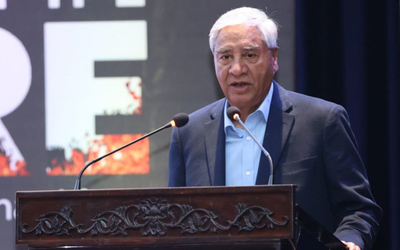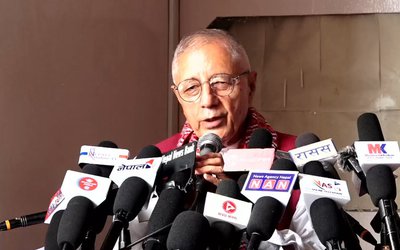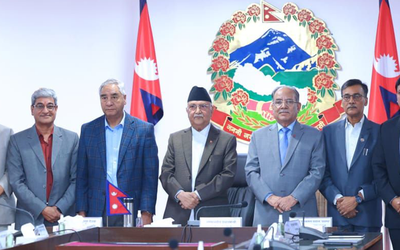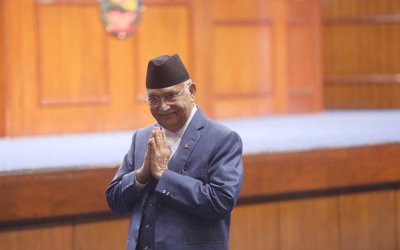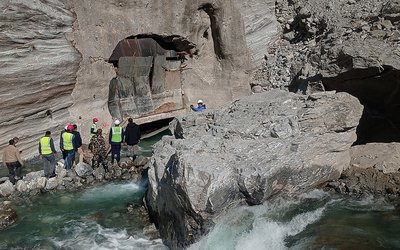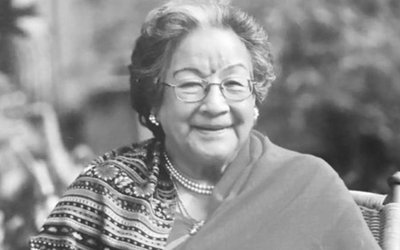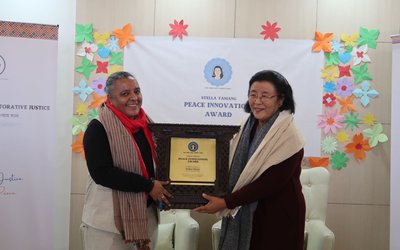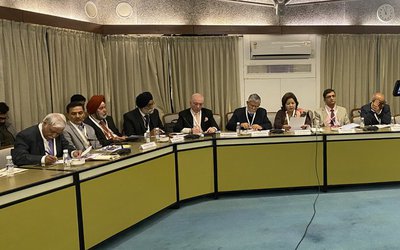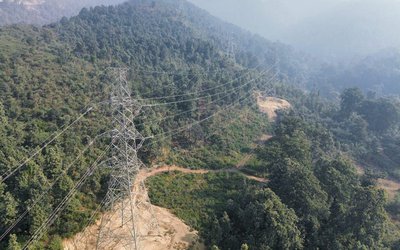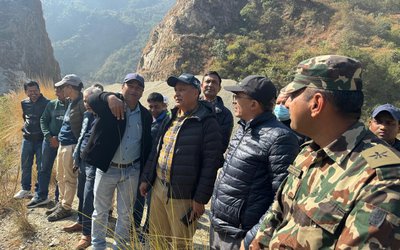
Eminent constitutional lawyer late Ganesh Raj Sharma, who edited a number of books of B.P. Koirala, once questioned Nepali Congress supremo Girija Prasad Koirala at his residence in Dhobidhara: Why shall the Nepalese remember the present?
Late Koirala, who was leading Nepali Congress government
at that time, avoided the answer. Sharma
posed this question in the context when Nepali Congress was organizing the National
Reconciliation Day throughout the country, remembering late B.P. Koirala back in
2000.
Late Sharma, who had seen many ups and downs of Nepali Congress and ins and outs of its leaders, was convinced that Nepali Congress may have drawn the conclusion that there is no leader who stands for the conviction and conscience needed to uphold the ideals of democracy and nationalism.
Although B.P.’s brother late Koirala led Janandola I and II up to the declaration of Nepal as a Republican, Federal and Secular state and he was the longest serving prime minister in the history of Nepal, with almost 8 years in power in 15 years of politics, nobody noticed him.
Late Koirala, who was projected as a candidate for Nobel peace award after the latest political change, is now only in NC’s poster and NC is struggling to survive as a party after massive debacle in the elections suffered at the hands of the communist alliance.
As Nepali Congress is virtually wiped out in the first past the post system of recently held elections, NC leaders prime minister Sher Bahadur Deuba and his junior colleagues remembered BP’s national reconciliation day while hurling blames on one another.
All the so-called new generation of NC are also responsible for the present debacle. They too contested the election by giving up BP’s ideology.
However, even 34 years after his death, people of all ages and all spectra of Nepalese politics remember B.P. Koirala, though he was in power for less than 16 months and he spared his entire life in prison or in exile in India.
Whatever the circumstances he faced, elder Koirala never compromised with his conviction on National Reconciliation and he dared to speak his conviction upholding the values of liberal democracy and nationalism. However, all his colleagues including his own brother late Koirala to the present disciple prime minister Sher Bahadur Deuba sacrificed everything to go to the power.
B.P.’s colleagues reaped the benefits of power by compromising the ideals but what they lost was their personal identity. After joining hands with populist communists, sacrificing the ideals of democracy and nationalism, the same populism swept them.
“If democracy and nationalism have to be saved, we cannot afford to give in to populism. To save democracy we may at times have to take unpopular decisions and make the people accept them. Of course, that will have to be done not through autocratic methods but by convincing the people,” said B.P. Koirala in his interview to Indian journalist Bhola Chatterji.
Today, Nepali Congress stands at a crossroads, where it has to raise the slogan even radical communists like Maoist-Center and another communist party CPN-UML condemned it as violent act.
As B.P. Koirala always said that Nepali Congress will lose its identity if it gave up nationalism and democratic ideals, this is what is exactly happening to it. By launching the joint agitation with communists in 1990 against the traditional force of monarchy, Nepali Congress deviated from its ideology of reconciliation. In Janandolan II, under late GP’s leadership, Nepali Congress joined hands with violent Maoists against monarchy and liberal democracy. Even founding leader of Nepali Congress Krishna Prasad Bhattarai quit the party after this decision.
Despite declaring Nepal as a federal, democratic, secular republic, nothing has substantially changed. Nepal continues to face a series of political instability one after another. In this process, many political leaders have been swept in and out of power.
Along with the institution of monarchy, Nepali Congress and its ideology were swept away by destabilization. Whether saint prime minister Bhattarai or supreme leader of Janandolan I Ganesh Man Singh or supreme leader of Janandoan II GPK, no one was spared by the radical wave. Portrayed by Indian Prime Minister Dr. Man Mohan Singh following the Janandolan II as a statesman of South Asia, late Girija Prasad Koirala’s legacy, however, has already faded away.
As Nepali Congress is gradually proving itself irrelevant after compromising its ideals, the popularity of its leader B.P. Koirala and his policy of national reconciliation are going high. Nepal has changed from monarchical state to republican, unitary to federalism, but what has not changed is Nepal’s geographic location. This is where the policy of national conciliation fits so well.
The message B.P. sought to give homemade national reconciliation and national unity based on mutual trust and understanding was to give stability to nation and national leaders. However, foreign designed consensus founded on mistrust and suspicion will only push the country into prolonged political crisis.
Younger people don’t know even the name of leaders who led Janandolan I as Nepal’s political leaders have not left anything that they will be remembered for by the next generation of people. As Nepal is remembering B.P. Koirala and national reconciliation day even after four decades of his death, all the big actors of past radical political change are nowhere.
B.P. Koirala propounded national reconciliation in 1976, returning from eight years of political exile in India. However, he saw the factors of threat to the country’s existence were still there.
Although his own party Nepali Congress gave up the stand and vision laid down by B.P. Koirala, a silent majority of Nepalese still see B.P. Koirala’s vision of national reconciliation is necessary to bring stability, prosperity and national independence.
Nationalism and Democracy
The statement B.P. Koirala gave on return from foreign exile on December 30,1976
After a pretty long period of exile, we are returning to our country. On this occasion, I would like to say a few words to the countrymen.
Today, our country is in a national crisis. All have realized that this crisis is getting heightened since the last few years. As a result, the very national identity has been endangered. Others have also admitted this. All including the King have from time to time referred to the danger posed to national identity. We are returning to home after realizing this grave reality. We think that the lack of national unity is a major factor for such a national crisis as a result of which foreign elements have started to become successful in playing their dirty games and making Nepal a center of international conspiracy. National unity can be achieved only through a collective campaign and efforts of all Nepali people. Such a collective campaign does also lay the grounds for the institutional base for the emotional unity of the Nepali people. If the sloganeering alone could do this, the national unity would not have suffered so much nor our country would have landed in such a miserable condition in the last sixteen years. Today, there is selfishness, communalism, individualistic practices and the tendency to have external-tilt is rampant in the country. In such circumstances nationalism becomes the first casualty.
Till yesterday, our struggle was confined to the attainment of the people’s democratic rights. That’s why, we emphasized more on the democratic side. Today, there is a new dimension added to it. A dual responsibility has befallen the Nepali Congress. This second responsibility is, safeguarding the national identity. We have visualized two fold faces of today’s Nepal: Nationalism and Democracy.
It means the Nepali people should take the
responsibility of restoring democracy as well as safeguarding the nation. If we
talk of only one responsibility we will be following the wrong track by being
one-sided. And, if we emphasized only on the restoration of democracy, we will
not be contributing to addressing this national crisis. Moreover, we may even
fall into the trap of the foreigners by such one-sided action. Similarly, if we
talk of the nationalism only, we will be repeating the same 16-years-old hollow
slogans of nationalism, and will be siding with the authoritarianism. Such a
hollow slogan of nationalism cannot generate an internal willpower in the
countrymen to safeguard the nation. Therefore, we need now to understand that
the national unity can be built on the foundation of democracy only. And the
foundation of the democracy can be cemented by the economic development and the
just economic system. Therefore we feel that nationalism, democracy and
economic development are interdependent on each other.
It is well known that the Nepali Congress has taken historical and serious decisions from time to time in the national interest. The decision to wage the 1951 revolution and its executions are some examples. After finding that there was conspiracy to put off the elections forever, it took the leadership of national campaign for the holding of the elections. We received the cooperation from various parties in that campaign. Nepali Congress launched the resistance movement for democracy after the cruel and the fatal blow dealt to democracy in 1960. And today, we have taken this historical decision seeing the crisis the nation is facing. This is in accordance with the tradition of the Nepali Congress.
In the history of every nation there comes such moment when its people have to risk their lives to safeguard the national identity. We think, such a moment has come in Nepal today. Our well-wishers had advised us not to return Nepal seeing the dangers involved in it. We would like to tell them that we have taken this historical decision because the likely danger to our lives is nothing as compared to the danger to the nation. The workers of Nepali Congress have also shown the example of unprecedented courage and love towards nation by returning to the motherland following the party directives.
In this hour of national crisis, all of us should get united by forgetting and ending the past unhealthy debates, experiences and differences. Our program should be directed by the feeling that we will no more exist in the absence of our nation. I do not know what fate awaits me after I return to the country. Through this statement, as the Chairman of Nepali Congress, I would like to appeal to the entire countrymen that let us all unanimously unite in the pious task of defending the nation, its progress, happiness and prosperity of the people. If I get an opportunity, I will put forth my feelings before His Majesty also. The responsibility to save the nation is the common responsibility of all.
Jai Nepal!
Bishweswor Prasad Koirala
Dec.30, 1976
(This excerpt has been reproduced in order to re-emphasize the importance of national reconciliation)

Keshab Poudel
Poudel is the editor of New Spotlight Magazine.
- The Question Arises: Do Former Prime Ministers Prachanda, Nepal, And Dr. Bhattarai Support The Terror actions Of Hamas?
- Dec 11, 2024
- MD KUL MAN GHISING: December 25 Deadline For Upper Tamakoshi
- Dec 09, 2024
- ADB's REFP Reintegration of Returnee Migrants
- Dec 02, 2024
- The Relationship Between Kosovo And Nepal Is Robust: ELBERT KRASNIQUI
- Nov 29, 2024
- ADB’s REFP: Women (Em)Power
- Nov 28, 2024



